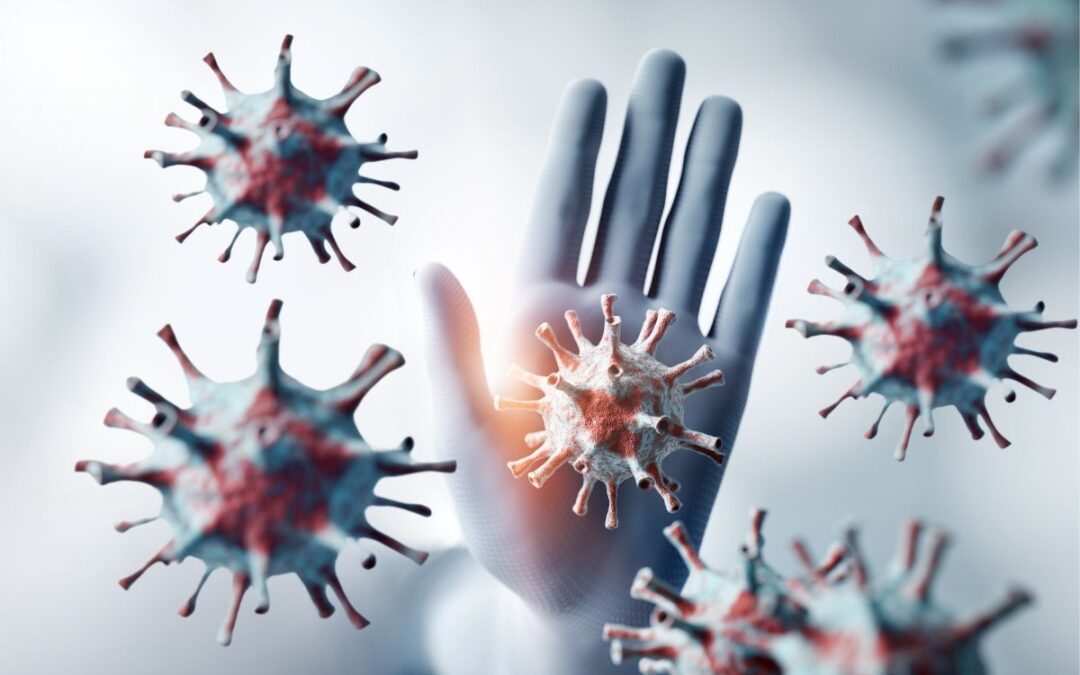Recovering from a viral infection is not just about overcoming the acute phase of the illness; it also involves restoring and strengthening long-term immune resilience. Post-viral immune dysfunction can lead to prolonged symptoms, increased susceptibility to infections, and chronic inflammation. This article explores evidence-based strategies to support immune recovery and promote long-term immune resilience.
Understanding Post-Viral Immune Dysfunction
After a viral infection, the immune system may experience lingering dysregulation, characterized by:
- Immune exhaustion: A state where T-cells and natural killer (NK) cells become less effective (Wherry & Kurachi, 2015).
- Inflammatory cytokine imbalances: Persistent inflammation due to excessive cytokine production (Peluso et al., 2021).
- Microbiome disturbances: Altered gut flora affecting immune homeostasis (Zuo et al., 2020).
- Mitochondrial dysfunction: Impaired energy metabolism linked to post-viral fatigue (Dardalhon et al., 2019).
Strategies for Long-Term Immune Resilience
1. Nutritional Support
A balanced diet rich in vitamins, minerals, and phytonutrients is essential for immune recovery.
- Vitamin D: Enhances T-cell function and reduces inflammation. Studies show that sufficient vitamin D levels correlate with reduced infection risk and severity (Aranow, 2011).
- Zinc: Supports immune cell function and helps repair damaged tissues (Read et al., 2019).
- Vitamin C: Plays a key role in reducing oxidative stress and enhancing immune cell efficiency (Carr & Maggini, 2017).
- Polyphenols and flavonoids: Found in berries, green tea, and dark chocolate, these compounds have anti-inflammatory and immune-modulating effects (Di Meo et al., 2020).
2. Gut Microbiome Restoration
The gut microbiome is integral to immune function, and post-viral infections can disrupt microbial balance.
- Probiotics and prebiotics: Lactobacillus and Bifidobacterium strains have been shown to improve immune resilience (Kang et al., 2018).
- Fermented foods: Kefir, sauerkraut, and kimchi support gut health by promoting beneficial bacteria (Marco et al., 2017).
3. Lifestyle Interventions
- Regular physical activity: Moderate exercise enhances immune surveillance and reduces chronic inflammation (Nieman & Wentz, 2019).
- Adequate sleep: Sleep deprivation weakens immune function and prolongs recovery (Besedovsky et al., 2019).
- Stress management: Chronic stress suppresses immune function; mindfulness and meditation can mitigate its effects (Black & Slavich, 2016).
4. Herbal and Natural Immune Modulators
- Elderberry (Sambucus nigra): Demonstrates antiviral properties and supports immune function (Hawkins et al., 2019).
- Astragalus: Modulates immune response and reduces inflammatory markers (Block & Mead, 2003).
- Curcumin: Anti-inflammatory and antioxidant properties help mitigate post-viral immune dysregulation (Jurenka, 2009).
5. Medical and Integrative Approaches
- Low-dose naltrexone (LDN): Shows promise in regulating immune response and reducing chronic inflammation (Younger et al., 2014).
- Intravenous (IV) vitamin therapy: High-dose vitamin C and glutathione may support immune recovery (Mikirova et al., 2012).
- Personalized medicine: Genetic and biomarker testing can guide tailored interventions (Zhou et al., 2021).
Conclusion
Supporting long-term immune resilience post-viral infection requires a multi-faceted approach encompassing nutrition, gut health, lifestyle modifications, and targeted supplementation. Ongoing research continues to unveil strategies to optimize immune recovery and prevent long-term complications. Integrating evidence-based interventions can help individuals regain vitality and maintain robust immune function.
References
- Aranow, C. (2011). Vitamin D and the immune system. Journal of Investigative Medicine, 59(6), 881–886.
- Besedovsky, L., Lange, T., & Born, J. (2019). Sleep and immune function. Pflugers Archiv-European Journal of Physiology, 471(4), 501–510.
- Black, D. S., & Slavich, G. M. (2016). Mindfulness meditation and the immune system. Brain, Behavior, and Immunity, 57, 270–286.
- Block, K. I., & Mead, M. N. (2003). Immune system effects of echinacea, ginseng, and astragalus: A review. Integrative Cancer Therapies, 2(3), 247–267.
- Carr, A. C., & Maggini, S. (2017). Vitamin C and immune function. Nutrients, 9(11), 1211.
- Dardalhon, V., Korn, T., Kuchroo, V. K., & Anderson, A. C. (2019). Role of Th1 and Th17 cells in autoimmunity. Nature Reviews Immunology, 19(7), 463–476.
- Di Meo, S., Venditti, P., et al. (2020). The role of flavonoids in antioxidant defense. Oxidative Medicine and Cellular Longevity, 2020, 1–16.
- Hawkins, J., Baker, C., Cherry, L., & Dunne, E. (2019). Black elderberry (Sambucus nigra) supplementation effectively treats upper respiratory symptoms. Complementary Therapies in Medicine, 42, 361–365.
- Jurenka, J. S. (2009). Anti-inflammatory properties of curcumin. Alternative Medicine Review, 14(2), 141–153.
- Kang, L. J., et al. (2018). Probiotics and their immune regulatory effects. Journal of Functional Foods, 42, 287–298.
- Marco, M. L., et al. (2017). The role of fermented foods in microbiome function. Current Opinion in Biotechnology, 44, 94–102.
- Mikirova, N., et al. (2012). Intravenous vitamin C in immune support. Journal of Translational Medicine, 10, 36.
- Nieman, D. C., & Wentz, L. M. (2019). The compelling link between physical activity and the body’s defense system. Journal of Sport and Health Science, 8(3), 201–217.
- Peluso, M. J., et al. (2021). Persistent immune activation and COVID-19. Nature Communications, 12, 2454.
- Read, S. A., et al. (2019). Zinc and immune modulation. Nutrients, 11(3), 552.
- Wherry, E. J., & Kurachi, M. (2015). Molecular and cellular insights into T cell exhaustion. Nature Reviews Immunology, 15(8), 486–499.
- Younger, J., Parkitny, L., & McLain, D. (2014). The use of low-dose naltrexone in clinical practice. Pain Medicine, 15(2), 358–365.
- Zhou, F., Yu, T., Du, R., et al. (2021). Personalized medicine in post-viral recovery. Frontiers in Medicine, 8, 1234.


